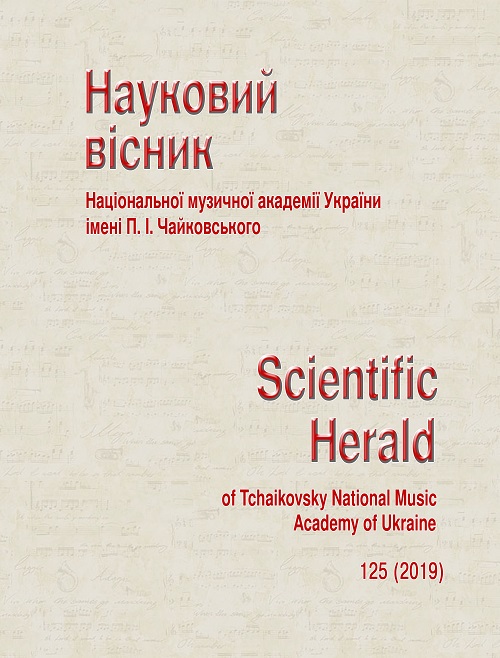Methodological Principles Applied for Analyzing the Dynamics of Individual Musical Style
DOI:
https://doi.org/10.31318/2522-4190.2019.126.197968Keywords:
individual musical style, methods of musical analysis, musical cosmogony theories, number-related symbolismAbstract
Relevance of the study. Examination of individual musical style requires substantial summarization of scientific results and bringing them into a new information and exploration space, which should resonate with scientific discoveries in the related fields of knowledge. The study substantiates the need for a new methodological approach to the analysis of an individual musical style as a systemic integral unity. The author recommends calling this new methodology “sacro-holistic”, i.e. the one that corresponds to the highest possible degree of scientific generalization as of today. The concept of an “individual style” is explained in an expanded manner: not only as a composer’s style, but also as a style of a performing musician and other explainers of music (musicologists, educators, critics, lecturers, etc.). Creative personality determines the dynamics of formation of the style basic characteristics. Different stages of this process require application of different analysis techniques identified in the article.
Main objective of the study. The main objective of the study is to explain the need for a new (sacral-holistic) methodological approach to the analysis of an individual musical style, which can correspond to the highest possible scientific generalization as of today.
Methodology. History-based method is used to identify the series of methodologies in all major areas of public conscience that are directed by cosmological factor of integrity; and system-based method is used to develop a classification system for the analysis of individual musical style at different stages of its formation.
Findings and conclusions. In a view of radical transformations in scientific concepts of the twentieth century, the methodology for analyzing an individual musical style should also be modified. The main argument for introducing methodological novelties into musicology is the following: in analyzing the artistic style, it is necessary to take into account the personality of the author, i.e. all individual and psychophysiological factors affecting its formation. The significance of such approach lies in the fact that it will open yet another channel for comprehending a human being as a cosmic phenomenon and provide new implications to the entire humanitarian scientific knowledge that has always sought to recognize music as a particular sacred sphere of the Being.
Downloads
References
Goethe, J. (1953). V. Faust. [Faust]. Leningrad: HYKHL, pp. 113–114 [in Russian].
Goryuhina N. (1974). Musical form and style: abstract of the dissertation of a doctor of art history [Muzyikalnaya forma i stil: Avtoref. disseartatsii doktora iskusstvovedeniya]. Moscow, p. 56 [in Russian].
Zharkova, V. (2018). Ten views on history of Western European music. Secrets and wishes of Homomusicus: Study in two volumes [Desyat vzglyadov na istoriyu zapadnoevropeyskoy muzyiki. Tayny i zhelaniya Homomusicus: Monografiya v dvukh tomakh]. Volume One. Kyiv: ArtHuss, p. 33 [in Russian].
Izraitel, B. (2016). Astrology of a human being [Astrologiya cheloveka]. Moscow: VShKA, p.158 [in Russian].
Leibniz, G. (1982). Collected works in four volumes [Sobranie sochineniy v chetyireh tomah]. Volume One. Moscow: Mysl, p. 404 [in Russian].Losev A. (1990) Music as subject of logic [Muzyika kak predmet logiki] in: Losev A. From early works [Iz rannih proizvedeniy]. Moscow, p. 331 [in Russian].
Medushevskiy, V. (2007). On essence of music and worldview task in musicology. Methodological function of Christian worldview in musicology [O sushchnosti muzyki i zadache muzykovedeniya. Metodologicheskaya funktsiya khristianskogo mirovozzreniya v muzykoznanii]. Moscow, Ufa, p. 11 [in Russian].
Moskalenko, V. (1998). Creative aspect of music style [Tvorchiy aspekt muzychnogo stilyu], in: Kiїvske Muzikoznavstvo. Issue One, pp. 87–93 [in Ukrainian].
Poberezhna, H. (2009). Musical and logical principles of being (Commentary on music and cosmogonic theories [Muzychno-lohichni osnovy buttia (Komentar do Muzychno-Kosmohonichnykh Teoriy)] in: Stavropihiiski Filosofski Studiyi. Issue Three. Lviv: Stavropihion, pp. 9–44 [in Ukrainian].
Poberezhna H. (2008). Non-traditional sources of comprehending the algorithm of being [Netradytsiini dzherela piznannia alhorytmu buttia]. In: Stavropihiiski Filosofski Studii. Issue One. Lviv: Stavropihion, pp. 36–48 [in Ukrainian].
Poberezhna, H. (1999). Creative personality of crisis epoch (from Tchaikovsky to Silvestrov) [Tvorcha osobystist kryzovoyi epokhy (vid Chaikovskoho do Sylvestrova)]. In: Dukhovnist i Khudozhno-Estetychna Kultura. Kyiv: HII Problemy Liudyny. Volume Fourteen, pp. 535–540 [in Uktainian].
Poberezhnaya, H. (1999). On recursion phenomemon in Bible and music [O fenomene rekursii v Biblii i muzyke]. In: Muzika і Bіblіya. Kyiv: MDPP Drukar, pp. 20–30 [in Ukrainian].
Poberezhnaya, H. (2017). Numbers in words and acts of Jesus Christ [Chisla v slovakh i delakh Iisusa Khrista]. Kyiv: DIA. 96 pp. [in Ukrainian].
Toynbee, A. (1991). A study of history [Postizheniye istorii]. Moscow: Progress. 736 pp. [in Russian].
Tyshko, S. (1994). National style of Russian opera. Theory and evolution: dissertation of doctor of art history [Natsionalnyi stil russkoy opery. Teoriya i Evolyutsiya: dissertatsiya doktora iskusstvovedeniya]. Kyiv: Kiyevskaya Konservatoriya imeni P. I. Chaykovskogo. 257 sheets. DS48992 [in Russian].
Downloads
Published
How to Cite
Issue
Section
License
Our journal abides by the CREATIVE COMMONS copyright rights and permissions for open access journals.
Authors, who are published in this journal, agree to the following conditions:
The authors reserve the right to authorship of the work and pass the first publication right of this work to the journal under the terms of a Creative Commons Attribution License, which allows others to freely distribute the published research with the obligatory reference to the authors of the original work and the first publication of the work in this journal.
The authors have the right to conclude separate supplement agreements that relate to non-exclusive work distribution in the form in which it has been published by the journal (for example, to upload the work to the online storage of the journal or publish it as part of a monograph), provided that the reference to the first publication of the work in this journal is included.




